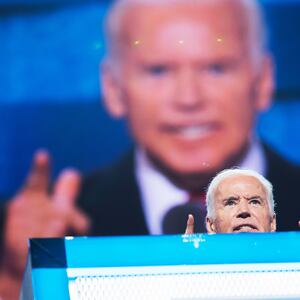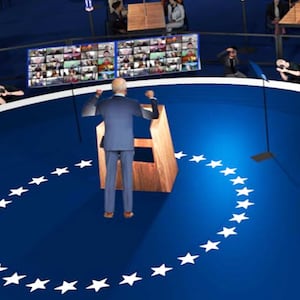Even by the preposterous standards of 2020, the road to the Democratic National Convention has been an unpredictable one.
In 12 short months, the Democratic Party’s vision for quadrennial confab has changed from a coronation for one of dozens of potential nominees to an almost entirely virtual affair, with speakers beamed in from around the nation, turning the traditional week-long political schmooze-fest into perhaps the most ambitious Zoom meeting in history.
But beyond the effects of the coronavirus pandemic, which has shrunk the scale of the convention from the typical 10-hour speech-a-thon with $500,000 “Platinum” boxes and rock concerts into a tightly programmed—and even more tightly edited—event, the thought of what could be this year’s DNC has undergone multiple personality changes.
It wasn’t too long ago that some Democrats appeared enthusiastic to nominate Sen. Elizabeth Warren (D-MA) last summer. And dreaded the idea of a longshot contested convention as Sen. Bernie Sanders (I-VT) rose in the early states. And then, effectively, wrapped up the race in mid-March. All while keeping party officials just barely in the loop.
Starting at 9 p.m., the convention will have a different tenor than in previous years, with Democrats hoping that virtual speeches from the party’s brightest stars will emphasize that the about-to-be-nominee, former Vice President Joe Biden, will meet the moment of the pandemic and its accompanying economic destruction.
The remote event, Biden said in a recent fundraiser, will hopefully set an example for Americans during a time of crisis—and, the party hopes, will highlight the absence of leadership under the administration of President Donald Trump.
“I’ve wanted to set an example as to how we should respond individually to this crisis,” Biden said last week, describing his hopes for the all-virtual convention. “From the start of the process, we’ve made it clear... Science matters.”
The campaign hopes that virtual “watch parties,” hosted by a mix of celebrities (Connie Britton, Alyssa Milano) and newer Democratic names (former South Bend Mayor Pete Buttigieg, Los Angeles Mayor Eric Garcetti) will be enough to keep viewers excited without making light of the situation.
“Americans across the country are fired up to vote for the Biden-Harris ticket in November and restore the soul of our nation,” said Biden for President National Organizing Director Kurt Bagley. “There are 81 days until Election Day and we are ready to harness the energy on the ground to ensure that Joe Biden, Kamala Harris, and Democrats up and down the ticket are elected on November 3rd.”
The concerns that took the convention online were not expected. As several top candidates began to swear off large or corporate donors early in the primary contest last year, there was handwringing among the fundraising class as to whether a candidate with that ethos would prevail and doom their ability to pull off the event. That feeling was particularly prevalent when mentioned with progressive candidates like Warren and Sanders who have made pushes to limit the amount of corporate and tech money in politics. Previous convention cycles, for example, were sponsored by giants like Facebook.
Around February, as Sanders appeared to be on the march to the nomination, the debate over delegate allocation and of the optics of having a democratic socialist as the top of the ticket sparked a fresh round of panic. Sanders ultimately said that whoever has the most votes at the convention “should be the nominee,” leading some to grumble about how in 2016 he had a different message when up against Hillary Clinton. That particular worry became short-lived after Biden began to win contests in late February and COVID-19 swept both the two remaining contenders out of the auditoriums of Ohio in March to their respective bunkers in Delaware and Vermont.
But even the truncated list of speakers—many of them, including Rep. Alexandria Ocasio-Cortez (D-NY), allotted just 60 seconds to speak—has already ruffled some feathers within the party. Former Republican Gov. John Kasich, a longtime Trump foe, has been invited to address the convention, while former Housing and Urban Development Secretary Julían Castro was not included as a major speaker (he will have a smaller role). And there was some outrage over the lack of a Muslim American speaker altogether, particularly as Trump has targeted that population on the trail and in office.
After The Daily Beast spotlighted that shortage, a DNC official said that the lineup “will include representation from the Muslim American community.” Former New York City Mayor Michael Bloomberg, another ex-Republican and Trump critic, has also received an eye roll from some who have questioned why the billionaire was invited to speak at all. Bloomberg spent much of his own primary bid feuding with leading Democrats in the party, including Warren, Sanders, and at times Biden himself.
In the lead up, Trump-aligned Republicans are having their own fun with the unpredictability of it all. On Sunday morning, Republican National Committee Chairwoman Ronna McDaniel wrote an op-ed in Fox News painting the upcoming event as a “radical” showcase for Biden’s agenda with his newly announced running mate, Sen. Kamala Harris (D-CA). “Democrats have chosen to go down the road of socialism, but we don’t need to blindly follow in their footsteps,” it read, in part. The piece touched on the so-called “socialist San-Francisco values” that Harris (a former San Francisco district attorney) brings to the table, along with a ding at Clinton skipping out on Wisconsin four years ago.
The Clinton-Wisconsin issue is not lost on Democrats and even Biden’s team. But they have taken pains to adhere to health best practices throughout the pandemic, and in turn, there were many iterations leading up to the finalized virtual event format, with Democrats longing for something that resembled a festive gathering as recently as June. Three months prior to that, when the virus had just begun to show signs of possibly impacting the election, the idea that the format might have to change was already on the minds of party officials nationally.
There were also inevitable tech concerns stemming from within the party. Last month, some Democrats felt uncertain about how the inner workings of a big Zoom event would play out in real time. It was not that long ago that the Iowa caucus presented considerable challenges for doing a high-stakes election event using technology.
Throughout the planning process, committee members and delegates often pleaded with party brass to be kept abreast of the changes. And they occasionally complained publicly when they didn’t feel heard.
Just before plans changed to move Biden’s speech location from Milwaukee to Delaware, one of the final tweaks in the drawn out process, three people received positive COVID-19 tests on the site, The Daily Beast reported. That occurrence further showed the significance of adhering to health requirements and keeping Biden away from large crowds.
Biden will speak on Thursday, while Harris will set him up the prior day. The two have already spent considerable time together since Biden shared his running mate pick to great excitement from Democrats last week.










